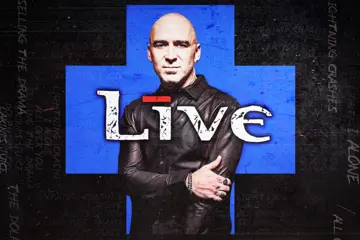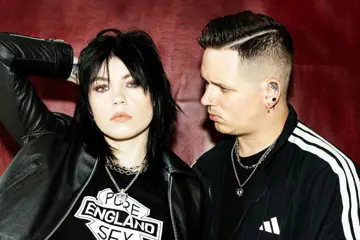Stereosonic founder and legend of the Australian dance music scene Richie McNeill has assured fans that the annual festival is in good hands and that there are even plans to expand, just a day after it was announced that US-based parent company SFX Entertainment had filed for bankruptcy.
Speaking exclusively to theMusic today, McNeill, who currently works with Totem OneLove, believes the move by SFX to file for Chapter 11 bankruptcy is "good news".
"Going into a Chapter 11 and a restructure, potentially wiping out the equity from the shareholders…is a great outcome," McNeill says.
Many speculated that the news meant Stereosonic would face a similar fate to so many popular festivals that have folded in previous years including Soundwave, Future Music and Big Day Out, however McNeill insists that Stereosonic is going nowhere.
"Stereosonic margins for 2015 as an operating event…was a profit increase from the previous year, so there’s no problems on this end. There’s a lot of good stuff coming, new events, there’s expansion in terms of the touring side of the business...[SFX bankruptcy] doesn't affect us," McNeill says.
Don't miss a beat with our FREE daily newsletter
"The thing that people need to understand is the definition of bankruptcy in America is not the definition of bankruptcy in Australia. A Chapter 7 is ‘close doors, it’s all over’, a Chapter 11 is a reorganisation…it’s a restructure. At the end of it, the company is private, we have a new CEO of Live which is exciting, we don’t have to open our books to everybody, we don’t have to pay twenty million plus in corporate costs of being a publicly listed company…it’s good news for the company, definitely."
McNeill stepped away from the music business in 2014 to spend more time with his family, though his love for music and concern of the general landscape of Australia's music scene inspired him to come back.
"There was many factors for leaving and there was many factors for coming back," he explains.
"What’s going on in Australia, it’s turned to shit at the moment. I was kind of looking at what was going on and I know it’s not my problem but I'm very passionate and I've been a very big part of electronic music in Australia since the late ‘80s/early ‘90s and it was disheartening. There’s hardly any festivals left, the lockouts thing, what’s going on with the drug issues…it’s just kind of been crazy."
In recent months, dance festivals have been scrutinised by government and authorities following two deaths at Stereosonic in Sydney and Adelaide respectively, while a woman was left in a critical condition and over 180 more were charged at New Year's Day festival Field Day.
The news prompted the government to publicly announce they will axe music festivals altogether if the problem is not fixed, however McNeill says it is wrong to point the fingers at the organisers.
"I'm sick of seeing festival organisers being blamed for the idiot, stupid behaviour of narrow-minded individuals that are taking poison, that are poisoning themselves with these cheap shitty drugs," McNeill says.
"I think the behaviour of Australians overall, from sporting events to entertainment to just in general, from young people needs to improve. Basically there’s a lot of disrespect across the board in the community with young people and I think it’s got a lot to do with policy on everything from alcohol, to drugs, to the media that’s fed down their throat, to the internet and the availability of so much stuff now…
"There is a ton and ton of basic fundamental issues with the country that contribute to the society now of young people that are disconnected from the older generation and are more armed, more intelligent than before, more savvy and educated and smarter, but also there’s a lot more idiots out there."
McNeill specifies the impact that the internet has on youth and how it cannot be underestimated.
"It’s a ton of issues to contribute to why Australia is a country I'm not so proud to what it was 20 years ago," he continues.
"Look at porn for example. When I was a kid, you’d go into 7/11 and all you saw was magazines…wrapped up in a plastic bag, you couldn’t see the cover, you’d have to show ID. Now any five year old kid can get on the internet in Australia and access the most hardcore stuff…we have a ton of social issues here that the government needs to look at and they need to move really quick. They want to blame festivals on the drug issues, ‘Oh we’ll blame the music promoters’, the violence on the streets, ‘We’ll blame alcohol’ and the gang-ship going on in Sydney, ‘We’ll blame unemployment’, I mean come on, get real, get realistic. Start listening to people that work with these young people, like ourselves as promoters, that have been working with youth for 25 years, bring us in on some discussion. We can give you some insight, we can give you some help, we can potentially help with solutions. But the world and the country Australia is not in a good way."
Many have argued that pill testing could be an affective way to combat drug-related incidents at festivals, including a number of musicians such as Illy and Peking Duk and McNeil says the government should be willing to try anything that could have a positive impact on society,
"It needs to be properly discussed, that’s the first thing," he says.
"Anything that is going to potentially save a life, potentially rid the country of shitty poisonous drugs that are out there being sold as something else, anything that is going to put these drugs dealers out of business…and anything that is going to reduce that market place and make it smaller and increase the police’s chance of taking some control back, I think is a positive."
McNeill goes on to say the main focus should be on saving lives.
"We have lost the war on drugs, we lost it years and years ago," he says.
"Look at ice, it’s no longer heroin, the street issue is ice. Look at what is going on with that, it is devastating how it is riddled the country towns and the suburbs and the cities of this country. Here we’ve got the biggest problem per capita of any country, it’s insane."
While McNeill describes the use of sniffer dogs as a "double-edged sword", he explains that using that with another initiative such as amnesty bins could curb people using drugs at music festivals.
"Maybe if we have amnesty bins at the front and people see the dogs and panic, you can throw it in the bin. Walk away, no problem. You don’t get arrested, you go in and have a good time and you don’t put yourself under incredible risk," he suggests.
"There’s lots of simple little things, we’re not reinventing the wheel here, that already exist in Europe and other countries, let’s do it. If it saves three lives a year of the seven that died of drug related deaths last year in the country at events, I think we can put some simple things in place that can maybe avoid that from happening…of course, it’s going to need to be continually reviewed but I think the police are doing the best job that they can with the resources that they have.
"Surely with the bins, let’s say 200 people drop their stuff in the bin. You know what? If it’s 200 out of 50,000…and it takes 200 people out of risk I think it’s worthwhile."
McNeill concludes that the time has come for the government to stop pointing the fingers at others and start to make changes.
"I think we shouldn’t even be having the discussion, I think we should be talking more about how we’re going to roll it out with the government, not ‘Can we do it?’ This is the problem – we spend too much time talking about covering eachother’s arses of who is responsible when the shit goes down…"















